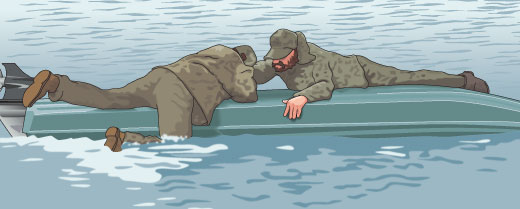What You Learned (cont.)

Hunters often use boats in difficult conditions, such as wind, cold, and snow. Special care must be exercised to ensure a safe trip.
- Leave a hunting plan with family or friends.
- Load the boat properly.
- Make sure each person wears a life jacket.
- Do not go if wind and water conditions aren’t safe.

Before boarding the boat, unload and case each firearm. Place the firearm in the boat first. When duck hunting with two persons, sit back-to-back.

To survive a water emergency:
- Always wear a U.S. Coast Guard–approved personal flotation device (life jacket) while you’re in the boat. Life jackets will keep you afloat and help you keep warm.
- If you get caught in a storm and your boat swamps or capsizes, stay with the boat.

Sudden immersion into cold water can cause immediate, involuntary gasping; hyperventilation; panic; and vertigo—all of which can result in water inhalation and drowning. If you fall into cold water, don’t panic. Put on a life jacket immediately if you don't already have one on. Try to reboard your boat, or get as much of your body out of the water as possible.

All-Terrain Vehicles (ATVs) are special-purpose vehicles that require careful, responsible handling and good judgment. Carry firearms unloaded, cased, and on a proper gun rack. Use ATVs only to get to the hunting area or to haul an animal from the woods—don’t shoot from an ATV. Check on your state’s rules and regulations before using an ATV when hunting.